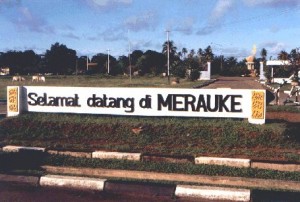A study compiled and released by Septer Manufandu of Papua NGOs Cooperation FORUM includes a highly skeptical review of plans for a “food estates” to be created in the area of Merauke. The report, only the latest of a series of negative reviews, underscores the consequences for Papuans of a migration of vast numbers of non-Papuans into the area to work the estates.
The fate of Papuans who now inhabit and work the targeted land according to the report is dire with expectations that they will be pushed aside to make way for newcomers and “development,” as had been the plight of Papuans in the past. The Government itself has estimated that as a consequence of the “estate” project in Merauke, the local population could grow from a current figure of 175,000 to 800,000, most of these presumably non-Papuan migrants. Reputable Papuan NGO’s have calculated inflows of migrants as a result of central government-planned ‘development” projects in West Papua will grow to millions, easily overwhelming the Papuan population of approximately two million. Papuan Governor Suebu has spoken of his concern about uncontrolled migration into Papuan territory and has urged the local Parliament to explore legislation that would impose some degree of control over the influx.
The Merauke Integrated Food and Energy Estate (MIFEE) is but the first of seven such food-producing estates being planned for West Papua. It will encompass an area of 1.6 million hectares. Thus far, 32 companies have expressed an interest in investing in the project, and six of these have already been granted licenses.
The Estate was also the subject of sharp criticism by the Aliansi Masyarakat Adat Nusantara (AMAN) which delivered a statement April 23 to the UN Permanent Forum on Indigenous Peoples in New York. The statement, endorsed by 26 Indonesian and international NGOs, noted in part:
“This kind of large-scale business in Indigenous Territories, without their Free, Prior and Informed Consent (FPIC) will only exacerbate the human rights situation, leading to forced evictions and other human rights violations.” The statement included several recommendations, among these that “the Government of Indonesia invite the UN Special Rapporteur on the Situation of Human Rights and Fundamental Freedoms of Indigenous Peoples and the UN Special Rapporteur on the Rights to Food, to visit and to make a report concerning the situation of Indigenous Peoples in Merauke and West Papua in general, affected by MIFEE and other business development.”
Although the Forestry Ministry has said the project would utilize “idle forestlands in Merauke,” environmentalists worry that the projects would add to massive deforestation and harm efforts to cut carbon emissions. In this context, the estates could jeopardize an international agreement between Indonesia and Norway intended to protect forestlands. The Governments of Norway and Indonesia in late May signed an agreement that requires Indonesia to desist from destruction of forests and peatland in exchange for a $1 billion grant from the Norwegian government.
WPAT Comment:
WPAT fears that these planned food estates will deprive Papuans of their traditional resources for hunting and fishing and destroy the very basis of their livelihoods. This would follow the pattern of other such “development’ schemes, most notoriously the Freeport McMoran copper and gold mine, which has displaced thousands of Papuans and has destroyed vast stretches of pristine forest. The mine has transformed an entire river system, the Ajkwa, into a disposal system for mine tailings, in the process destroying vast stretches of trees and polluting the riverine environment.The massive influx of government-organized, non-Papuan migrants to this “estate” in Merauke, and to other planned “development” projects could fundamentally alter the Papuan-migrant balance in West Papua. Considering the massive migration envisioned in the government planning, the projects could hasten the impact of past government policies and actions that have had the effect of a creeping genocide that relegates Papuans to a politically and economically disempowered minority status in their own homeland. Investors, particularly foreign investors, complicit in this planning could incur significant responsibility for such an outcome.
This is the 73rd in a series of monthly reports that focus on developments affecting Papuans. This series is produced by the non-profit West Papua Advocacy Team (WPAT) drawing on media accounts, other NGO assessments, and analysis and reporting from sources within West Papua. This report is co-published with the East Timor and Indonesia /Action/ Network (ETAN).













